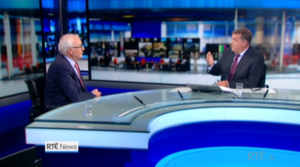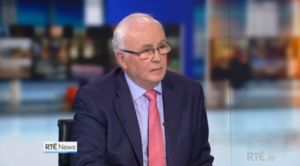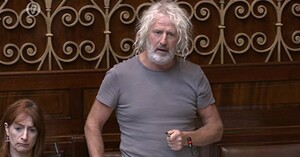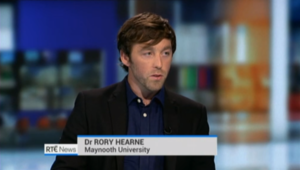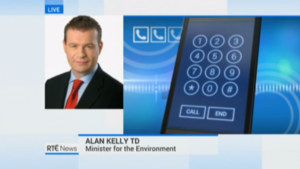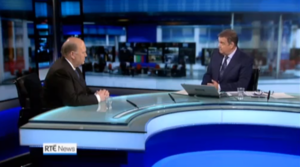
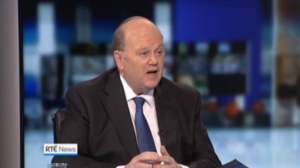 Finance Minister Michael Noonan on Six One last night.
Finance Minister Michael Noonan on Six One last night.
Michael Noonan gave the government’s latest position on the Siteserv deal last night to Brian Dobson on RTÉ’s Six One News . An account which directly contradicts former IBRC chairman Alan Dukes’ recollection.
Grab a tay.
Brian Dobson: “This was a deal that, because of the write-off of the debt, it cost the taxpayer, the State, over €100million. It was one of many such deals, of course throughout that period. But it was one you raised concerns about in the aftermath, it seems, of the deal being done. Now, at what stage and why did you become concerned about this transaction?”
Michael Noonan: “Well, first of all, Anglo Irish Bank was a bit of a disaster, the taxpayers put in €34million, when Fianna Fail were in Government, and I saw my responsibility to protect the taxpayer and, if possible, to reduce the cost of servicing the €32billion and we did that with the promissory arrangements and then to recover as much as we possibly could. And I found that we didn’t have the kind of flow of information I would have now with AIB, for example, because the arrangement that my predecessor entered into didn’t require transactions to be notified and I was in the position of having to answer to the Dáil and of being unsure of the flow of information, even though there was regular meetings between IBRC and Finance officials.”
Dobson: “So in relation to Siteserv then, you were only aware of the transaction, the fact that €100m, over €100m of debt had been written off and that the company had subsequently been sold to a company controlled by Denis O’Brien in March 2012, I think it was, you only became aware of that after the event?”
Noonan: “Yeah, I got a PQ [Parliamentary Question] in April and then I got briefed on it but there was a series of concerns about the relationship between IBRC and the Department of Finance at the time. And I had a number of meetings and, at one meeting, I was extensively briefed on issues from renumeration to new appointments of directors, to senior management and the Siteserv issue was an issue of concern as well.”
Dobson: “So why were you left in the dark? Was it that you didn’t ask the right questions, you didn’t say to the people in charge of IBRC, ‘what’s going on here? keep me briefed?'”
Noonan: “No, it was the legal arrangement, when Anglo became IBRC, between the then minister and the authorities in IBRC was that they didn’t have to notify anything that was commercial. The idea was to keep the commercial decisions at a distance from the politicians.”
Dobson: “Right.”
Noonan: “Which is reasonable…”
Dobson: “Even though it was the taxpayers’ interest that was at stake here.”
Noonan: “It’s a reasonable thing to do but, you know, I found that I needed more information then I was getting automatically so I actually subsequently changed the framework so that they had to notify any transactions over €100million.”
Dobson: “What your officials were saying to you and they were expressing concerns about this deal at the time and what they were saying is that you should have gone to the chairman of the IBRC and said, ‘I want an independent review of this transaction’ to get to the bottom of what happened. You didn’t. Why not?”
Noonan: “Well, that was the essence of it, but really what it was was important meetings. I’d have a kind of a note to remind me of the main issues and, in that note, the advice was to put it to Alan Dukes, who was the chairman, to have an outside inquiry into the transaction. But in the course of the meeting, Alan Dukes told me that he had got the board of IBRC to do a full review and that the board had assured him, and he was assuring me, that what happened was in the best interest of the State and consequently of the taxpayer.”
Dobson: “But the board carrying out a review is very different to an independent review.”
Noonan: “Yes but to say you could review something if there was a possibility of changing anything but all transactions were complete. There was no legal possibility of a reversal and I trusted Alan Dukes.”
Dobson: “But presumably accountability is also important here. That people know what went on and why because there were aspects of this deal, your own officials raised questions about it, for example, that the shareholders in the company Siteserv, which was bust, were paid €5million.”
Noonan: “I had a meeting where Alan Dukes came in as chairman, Michael Aynsley came in as chief executive and we went through the issues and the conclusion of that was an assurance from the chairman, on behalf of the board, that everything was done properly and not only done properly but was the best result possible for the Irish taxpayers and that’s minuted. And I accepted that. Otherwise I’d have problems with allowing the board to continue. And…”
Dobson: “Did you get answers to the questions, for example, as to why some potential bidders were excluded from the process. I think one French company said they were willing to offer €60million for this company whereby it was sold for €45million.”
Noonan: “There was a series of allegations made before and after I had the meeting. But, in general terms, the deal was the deal and I was assured that the components of the deal were necessary to get the best result for the taxpayer and, you know, there was independent advice as well to the board of IBRC and they concluded the deal and…”
Dobson: “And the best deal for the taxpayer included €5million for the shareholders in a bust company?”
Noonan: “The view on that was that this was an essential component, or the advice was that the shareholders wouldn’t have concluded the deal otherwise and the longer it went on, the more the taxpayer were losing because the company was going downhill”
Dobson: “There are more documents, I think, to be released tomorrow [today] under Freedom of Information, we believe in the Irish Times. Will they address something else that’s referred to in the documents that had been released, that Siteserv wasn’t the only deal about which there was concern within your department?”
Noonan: “There was a lot of concerns about different issues and these will be recited in tomorrow’s, in tomorrow’s release, under Freedom of Information but everything that people are saying about Siteserv now were the issues that I was briefed on when I had a series of meetings and one in particular with the chairman and the chief executive of the company.”
Dobson: “OK well more to come on this…”
Noonan: “More to come tomorrow, yeah.”
Dobson: “Minister Noonan, thank you very much.”
Watch here
Yesterday: Throwing Alan Under The Bus
Previously: Siteserv on Broadsheet










